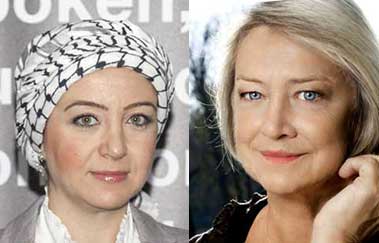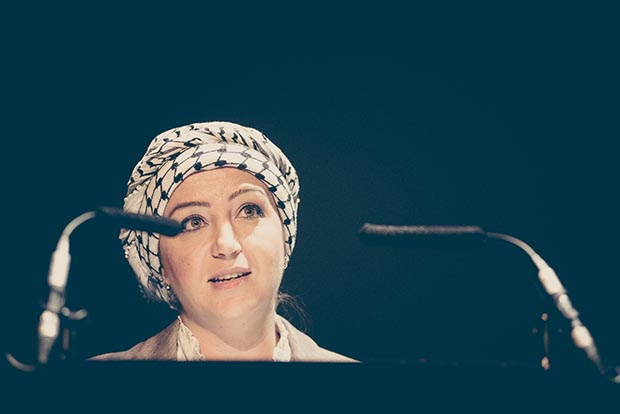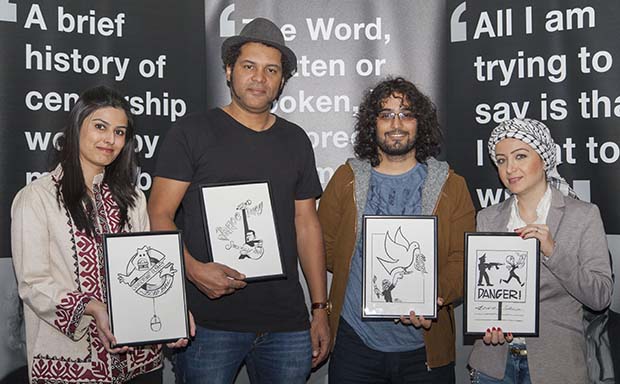7 Oct 2016 | Awards, Fellowship, Fellowship 2016, Middle East and North Africa, News and features, Syria
On 24 September Index on Censorship’s CEO, Jodie Ginsberg, gathered with former BBC chief news correspondent Kate Adie and 2016 Index award-winning journalist Zaina Erhaim in Kew Gardens to discuss journalism in war zones. Sophia Smith-Galer, Index on Censorship youth board member, attended the event and also spoke with Channel 4’s international editor, Lindsey Hilsum, and Clarissa Ward, a foreign correspondent for CNN, to create this podcast on women on the front line.
Nominations are now open for 2017 Index on Censorship Freedom of Expression Awards. You can make yours here.
26 Sep 2016 | Europe and Central Asia, Event Reports, Middle East and North Africa, mobile, News and features, Syria, United Kingdom

Journalists Zaina Erhaim and Kate Adie spoke at Write on Kew. (Photos: Sean Gallagher, Ken Lennox)
On 24 September Index on Censorship’s CEO, Jodie Ginsberg, gathered with former BBC chief news correspondent Kate Adie and 2016 Index award-winning journalist Zaina Erhaim in Kew Gardens to discuss journalism in war zones and what it’s like to be a woman reporting from crisis points.
Kate Adie has been a prominent figure in journalism since the 1980s, covering, among other major events, the 1980 London Iranian Embassy siege, the Tiananmen Square protests, the Rwandan Genocide and the war in Sierra Leone. After 14 years as BBC’s chief news correspondent, Adie now works as a freelance journalist, author and presents From Our Own Correspondent on BBC Radio 4.
Zaina Erhaim is a Syrian journalist known for her activism in Aleppo and teaching journalism skills to the men and women in Syria. Erhaim currently works as the Syria project coordinator with the Institute for War and Peace Reporting.
Ginsberg asked Adie and Erhaim what influenced them to become journalists. Erhaim said her mother was the only family members that supported her career choice. The rest of her relatives told her: “Nobody wants to marry a journalist.”
Growing up in a conservative society where the regime censored everything, Erhaim was inspired to study journalism in the UK. After the escalation of the war in Syria, Erhaim knew that she could never abandon her home in Aleppo. She returned to the ravaged city to train journalists, particularly women, to spread the untold stories of those hurt by the war.
Adie discussed how her generation was affected by the aftermath of World War II, with women being incorporated into the workforce during warfare then pushed “back to the kitchen” after the war ended. She admits that growing up she had no expectations for her career, but after visiting East Berlin during the Cold War, she discovered that the rest of the world was not as comfortable as the one she grew up in, fueling her desire to become a journalist.
Exploring the challenges woman face in journalism, Adie said that there were obvious concerns in countries that view women as secondary beings. The fear of being raped or assaulted is always present, she said, adding that there are judicial systems in place that could see her imprison for being a female out alone in public.
Adie emphasised that she does not like to be portrayed as a “woman journalist” but instead a “journalist who happens to be a woman”.
As a woman, Erhaim was not allowed to travel to the “front line” of the Syrian war. However, this allowed her to focus on the unreported stories and train Syrian women and men in journalism. She experienced some difficulty when training men, saying that many refused to look her in the eye because they thought it shameful to be taught by a woman. This was not something she cared about, considering her focus was to get the untold stories to the public.
An audience member later asked whether there are real front lines in warfare anymore, to which both Erhaim and Adie answered no. Adie stated that contemporary front lines are “complete fantasy,” stressing that war is no longer something that stays on the battlefield, but something that divides a village and follows you home.
Parting with advice for aspiring journalists, Erhaim simply stated: “Don’t go to war zones.” Adie reminded the audience that journalism is tough and often doesn’t pay well, but telling people about the world and bringing a story back will be the most rewarding feeling a journalist can accomplish.
More about Zaina Erhaim
Confiscation of Syrian journalist’s passport is appalling
Zaina Erhaim: “I want to give this award to the Syrians who are being terrorised”
#IndexAwards2016: Zaina Erhaim trains Syrian women to report on the war
24 Sept: Women on the front line at Write on Kew
26 Sep 2016 | Campaigns, Campaigns -- Featured, Statements, Syria, United Kingdom

2016 Freedom of Expression Journalism Award winner Zaina Erhaim (Photo: Elina Kansikas for Index on Censorship)
Index on Censorship is appalled by the decision of UK border officials to confiscate the passport of Syrian journalist, Zaina Erhaim. The Syria coordinator for the Institute of War and Peace Reporting, Erhaim has been recognised by a number of organisations internationally for her work training citizen journalists to report on the conflict within Aleppo.
Index invited Erhaim, in her capacity as winner of this year’s Freedom of Expression Awards, to an event at Write on Kew Festival to speak about her experiences alongside veteran journalist Kate Adie.
When Erhaim arrived in the UK on Thursday 22 September for the event she was detained by the UK Border Agency (UKBA) and questioned for an hour before UKBA confiscated her passport. Erhaim was told that the passport had been reported by the Syrian authorities as stolen and therefore UKBA was compelled to retain it and return it to the Syrian government.
Erhaim had her old passport, which remains valid but is effectively unusable because the pages are filled, and was able to enter the UK for the debate. Further travel may be impossible, however, as Erhaim no longer has a passport with which to apply for a new visa to enter Europe.
When Erhaim challenged this decision, she was told to seek consular advice from the Syrian government in Damascus.
“We are extremely disappointed by the treatment of Zaina by border officials. It seems quite astonishing that the UK would accede to a request from a government whom it has only this weekend accused of being complicit in war crimes – especially when it is clear that the Syrian government is using tools, such as passport rescindments, to harass those who oppose or expose its behaviour,” Jodie Ginsberg, CEO of Index on Censorship, said.
Index will be raising the matter with the Home Office and Foreign and Commonwealth Office.
If you would like to write a letter in support of Zaina Erhaim, address your correspondence to:
Rt Hon Amber Rudd MP
Secretary of State for the Home Department
Direct Communications Unit
2 Marsham Street
London
SW1P 4DF
[email protected]
Rt Hon Boris Johnson MP
Secretary of State for Foreign and Commonwealth Affairs
King Charles Street
London
SW1A 2AH
[email protected]
More about Zaina Erhaim
Women on the front line: Zaina Erhaim and Kate Adie on the challenges of war reporting
Zaina Erhaim: “I want to give this award to the Syrians who are being terrorised”
#IndexAwards2016: Zaina Erhaim trains Syrian women to report on the war
11 Jul 2016 | Awards, Events, Fellowship 2016, mobile

Journalists Zaina Erhaim and Kate Adie will speak at Write on Kew. (Photos: Sean Gallagher, Ken Lennox)
Join Index on Censorship’s CEO and two powerful journalists at Write on Kew to hear how and why reporters take risks to get close to the action, and discuss the vital role women can play in bringing truth to light.
Index’s Jodie Ginsberg will chair a discussion between 2016 Index on Censorship journalism award-winner Zaina Erhaim and former BBC chief news correspondent Kate Adie. Erhaim is a Syrian journalist who returned to her war-ravaged country and the city of Aleppo in 2013 to ensure those remaining were not forgotten. Adie has reported from countless war zones. Some used to say you should get on a plane at any airport wherever Adie was getting off one.
When: 24 September, 6:30pm
Where: Kew Gardens
Tickets: £16 or £13 from Kew (Use code index at checkout to claim discounted tickets).
Write on Kew returns in September for four days of talks and events with a fantastic selection of speakers from Fay Weldon to Brian Blessed.



